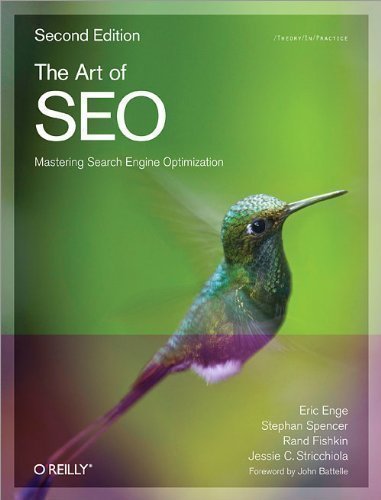The Art of SEO by Eric Enge, Stephan Spencer, Jessie Stricchiola, Rand Fishkin 2nd (second) Edition (2012)

“The Art of SEO is the Holy Grail of search engine optimization books.”
The Art of SEO is the Holy Grail of search engine optimization books. Among the major accomplishments of this weighty volume is that it organizes a massive amount of information into an utterly digestible read that aids the SEO student in fully understanding the interplay between numerous aspects of SEO without getting bogged down in too much detail.
A problem for all involved in SEO is the “constant evolution of web technologies.” The book reviewed here is a second edition. Yet because SEO evolves at a breakneck pace—literally on a daily basis—any book on the topic is quickly dated.
Fortunately the book’s quartet of authors (Eric Enge, Stephan Spencer, Jessie Stricchiola, and Rand Fishkin) provide numerous online resources for every aspect of SEO, so that once you have read the book, you can remain on the bleeding edge by tapping these in “real time”—lest you become an SEO dinosaur when Google makes a meaningful change in its algorithm.
Some of the online resources are those of the authors, though there is not a whiff of self-promotion here, with many other sources of up-to-the-minute SEO information and technique critiqued. Yes, there is much to digest, and the book does not oversimplify by providing shortcuts that will not be as effective as more comprehensive approaches. Brace yourself:
“There are literally thousands of details and tactics to learn, some of which may have little impact on their own but, when used in various combinations with other techniquess, can have a powerful influence on rankings. Herein lies the ‘art’ aspect of SEO.”
Sound overwhelming? Perhaps. Yet if you are after traffic—and lots of it, especially the right kind—you cannot build an awesome website and assume that legions will come, and even less so, that they will stay. You must master the techniques that will enable you to reach your traffic goals. Undoubtedly there are others with websites competing for your audience who are making the effort. Ignore SEO and you will be left behind.
The Art of SEO, 2nd Edition is of great use to both the SEO neophyte comfortable enough to tinker with a website, and the SEO professional who knows there is no end to the lessons to be learned.
Importantly, The Art of SEO debunks myths that certain dated SEO techniques remain effective. Some of these continue to be embraced by less savvy SEO professionals.
The authors methodically progress through the basics of SEO, touch on the broad range of tools in various chapters that will contribute to optimization, explain how these all fit together, and round out the book with advice for those on a shoestring, as well as individuals in large organizations needing to optimize an internal team, outsource productively, or both. The book concludes with musings on the future of SEO.
What is not directly discussed—but indirectly made clear through attention to SEO practices that are potentially counterproductive—is the huge mob of so-called SEO practitioners with shingles hung all over the Internet dispensing useless advice or providing little in the way of valuable services, often for exorbitant fees.
Many of the techniques provided by these services will do nothing for your ranking, or worse yet, cause your site to be penalized by search engines. Should you decide to use outside SEO services, what you learn in this book will enable you to quickly recognize those selling snake oil.
The Art of SEO exceeds 700 intricate pages that will pay for themselves many times over. Do obtain a copy of this SEO bible as quickly as possible and place it alongside your usual online work area for easy and frequent reference.
The Art of SEO—do not even consider building and/or managing a website without it. That would be sub-optimal.